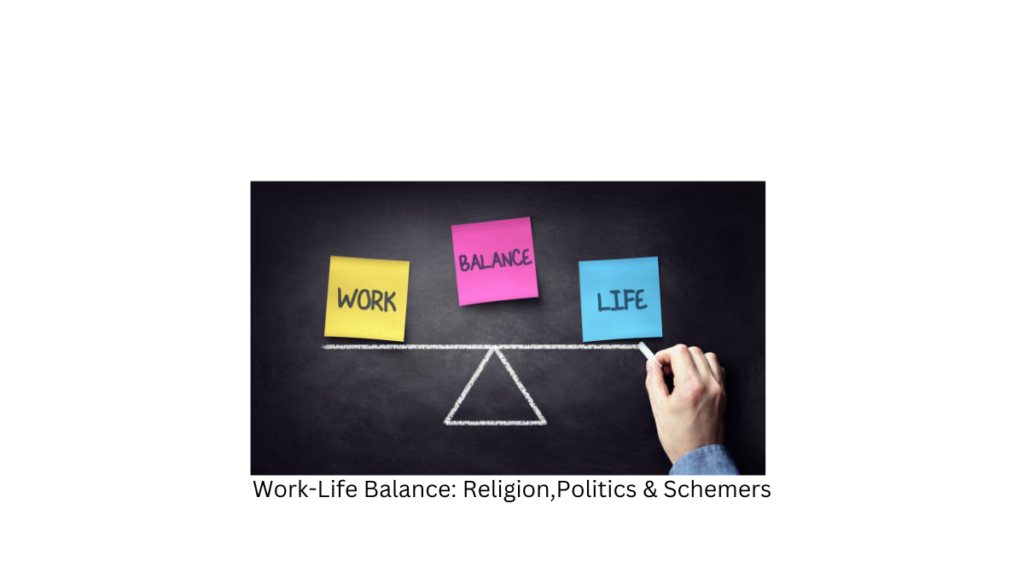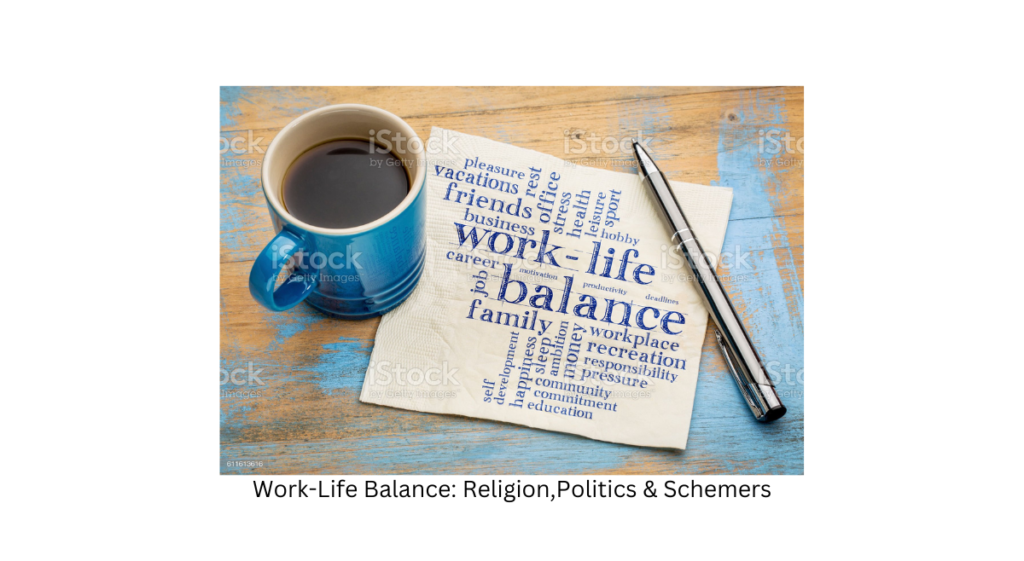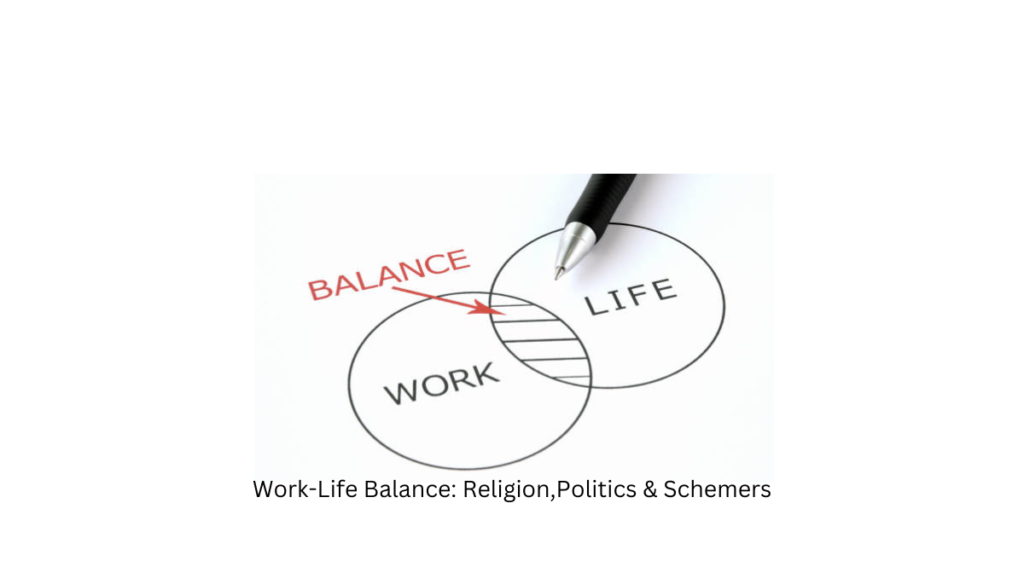Introduction:-
Work-Life Balance: Religion,Politics & Schemers

In today’s fast-paced world, achieving a healthy work-life balance has become a significant challenge for many. The demands of modern life, coupled with the constant connectivity enabled by technology, have blurred the boundaries between work and personal time. However, there are more factors at play than just work-related stressors. Religion, politics, and individuals with ulterior motives, often referred to as “schemers,” also contribute to this delicate equilibrium. In this article, we will explore the multifaceted influence of religion, politics, and schemers on our work-life balance and delve into strategies for maintaining harmony in this complex landscape.
What are the various ways in which religion, politics, and schemers influence our work-life balance, and what effective strategies can individuals employ to maintain harmony in this multifaceted and complex landscape?
The Pull of Religion:
Religion has been a fundamental part of human civilization for millennia, providing guidance, comfort, and a sense of purpose to billions of people worldwide. While the positive aspects of religion are undeniable, it can also exert a significant influence on our work-life balance. Here’s how:

- Time Commitment: Active participation in religious activities, such as attending services, festivals, or group gatherings, can consume a substantial amount of time. Balancing these commitments with a demanding work schedule can be challenging, leading to stress and a skewed work-life balance.
- Values and Priorities: Religion often shapes our values and priorities. While this can be a source of personal fulfillment, it can also lead to conflicts between one’s religious beliefs and professional obligations. Striking the right balance between these two spheres can be a constant struggle.
- Social Pressure: Within religious communities, there can be pressure to conform to certain norms and expectations. This pressure can extend to career choices, lifestyle decisions, and even the company one keeps. Navigating these expectations while pursuing one’s own work-life goals can be tricky.
The Intricacies of Politics:
Politics is another arena where personal and professional boundaries can intertwine, impacting our work-life balance in various ways:
- Political Engagement: Active involvement in political activities, such as campaigning, attending rallies, or participating in advocacy work, can demand significant time and energy. This commitment can sometimes clash with work responsibilities, causing tension.
- Policy Implications: Political decisions and policies can have a profound impact on individuals and businesses. Changes in taxation, regulations, and government initiatives can directly affect job security, income, and work conditions, making it challenging to separate political concerns from work.
- Workplace Dynamics: Differences in political beliefs among colleagues can lead to workplace conflicts and affect professional relationships. Managing these conflicts while striving for a harmonious work-life balance can be stressful.
Dealing with Schemers:
Schemers, or individuals with ulterior motives, can also disrupt our work-life balance in insidious ways:
- Manipulation: Schemers often manipulate situations and people for personal gain. This can include workplace politics, deceitful colleagues, or even toxic bosses. Dealing with such individuals can lead to increased stress and negatively impact one’s work-life balance.
- Influence on Decision-Making: Schemers may attempt to exploit our vulnerabilities and persuade us to make decisions that are not in our best interests. Falling victim to their tactics can have serious consequences for our careers and personal lives.
- Time Drain: Engaging with schemers can be a time-consuming endeavor. Whether it’s resolving conflicts or defending against their schemes, the time spent dealing with them can encroach upon our personal time and add to our work-life struggles.
Strategies for Achieving Balance:
Maintaining a healthy work-life balance in the face of religious, political, and scheming influences requires intentional effort and strategies:
- Prioritize Self-Care: Recognize the importance of self-care and allocate time for it regularly. This includes activities that promote physical and mental well-being, such as exercise, meditation, and hobbies.
- Set Boundaries: Clearly define boundaries between work and personal life. Communicate these boundaries to your employer, colleagues, and loved ones to ensure they are respected.
- Time Management: Efficient time management is crucial. Use tools and techniques like to-do lists, time blocking, and prioritization to make the most of your work hours and free up personal time.
- Seek Support: Reach out to your religious or spiritual community, political groups, or social networks for support and understanding. Discuss your work-life challenges and seek advice from those who have faced similar situations.
- Develop Resilience: Build emotional resilience to navigate the pressures and conflicts that may arise from religious, political, or scheming influences. Techniques such as mindfulness and conflict resolution can be valuable in this regard.
- Professional Assistance: If workplace schemers are causing significant distress, consider seeking guidance from HR or a mentor to address these issues effectively.
- Regular Reflection: Periodically reflect on your work-life balance to identify areas that require adjustment. Be open to making changes as circumstances evolve.
How does religion influence schemers and global politics?
Religion can have a multifaceted influence on schemers and global politics, impacting both positively and negatively. Here are several ways in which religion can intersect with schemers and global politics:

1. Moral and Ethical Guidance:
- Positive Influence: Religion often provides moral and ethical guidance to individuals and communities. It can promote values such as honesty, integrity, and compassion, discouraging unethical behaviors associated with schemers.
- Negative Influence: In some cases, religion can be manipulated by schemers to justify their actions. Extremist ideologies or the misinterpretation of religious texts may be used to rationalize unethical or harmful behavior.
2. Social Cohesion:
- Positive Influence: Religion can foster a sense of community and social cohesion, promoting cooperation and trust among its members. This can deter schemers from exploiting divisions within a society.
- Negative Influence: Schemers may exploit religious differences or tensions to create discord and conflict, thereby furthering their own agendas. Religious divisions can be manipulated to fuel political instability.
3. Political Alliances:
- Positive Influence: Religious leaders and organizations can play a constructive role in politics by advocating for peace, justice, and social welfare. They may form alliances with political leaders to promote shared values.
- Negative Influence: Religion can be used as a tool for political manipulation. Schemers may exploit religious leaders or institutions to gain support or legitimacy for their political ambitions, often leading to authoritarian or oppressive regimes.
4. Humanitarian Initiatives:
- Positive Influence: Many religious groups engage in humanitarian efforts, providing aid and support to those in need, irrespective of political affiliations. These initiatives can counterbalance the negative impact of schemers on global politics.
- Negative Influence: Schemers can obstruct or exploit religious humanitarian efforts for political or personal gain, hindering the alleviation of suffering in conflict zones or crisis situations.
5. Peacebuilding and Conflict Resolution:
- Positive Influence: Religion can be a source of inspiration for peacebuilding and conflict resolution efforts. Religious leaders and institutions may mediate in conflicts, advocating for reconciliation and harmony.
- Negative Influence: Schemers may manipulate religious divisions to escalate conflicts for their own interests, exacerbating tensions and hindering peace efforts.
6. Cultural Identity and Nationalism:
- Positive Influence: Religion can contribute to cultural identity and national cohesion, fostering a sense of belonging and shared values. This can promote stability in global politics.
- Negative Influence: Schemers may exploit religious identities to incite nationalism, xenophobia, or hatred, leading to regional or global instability.
7. Influence on Policy:
- Positive Influence: Religion can advocate for policies that align with principles of justice, human rights, and social welfare. Religious organizations may lobby for positive change in global politics.
- Negative Influence: Schemers may infiltrate religious institutions to advance their political agendas, potentially leading to the endorsement of discriminatory or divisive policies.
8. Education and Social Reform:
- Positive Influence: Many religious schools and organizations are involved in education and social reform. They can contribute to the development of educated and responsible citizens who resist the influence of schemers.
- Negative Influence: Schemers may use religious educational institutions to propagate extremist ideologies, promoting radicalization and undermining social harmony.
Conclusion
Achieving a work-life balance in the modern world is a complex endeavor. Religion, politics, and schemers can all influence this delicate equilibrium, but with awareness, proactive measures, and support from your personal and professional networks, it is possible to strike a balance that promotes well-being and personal fulfillment. Remember that your work-life balance is a dynamic process that may require adjustments over time so stay adaptable and prioritize your health and happiness.
https://youtu.be/BTXik0UUIT0?si=rzvoybjSs8OaGQU8





